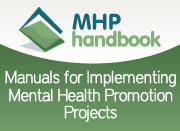Tools
- Utilities:
- Print this page
- Send this page
- Font size:
- Increase font size
- Decrease font size
Browse Database
Login, so as to add your own items.
-
Mental Health and Emotional Well-Being of Students in Further Education - A Scoping Study
26/05/2008
The study looks at pupils that are leaving a school and who are entering further or higher education. These are stressfull times. Thus, the study explored how to promote positive mental health and emotional well-being and responses on mental health problems by institutions. Settings: Education
MHP Steps: Preparation -
Attitudes and Images of Ageing
26/05/2008
This learning object is about ways in which people's experience of ageing and mental health are shaped by society's attitudes to older people and later life. You will consider the way age-related images and ideas, displayed in the media and in everyday language, shape our perceptions; but also what we know about older people's own attitudes and aspirations. Settings: Residence for Older People
MHP Steps: Implementation -
An Introduction to Mental Health and Older People
26/05/2008
In this learning object you will have the chance to explore the nature and characteristics of the ageing population in the UK, what being 'old' means, and some of the complexity surrounding the concept of 'mental health'. As this learning object presents basic facts and concepts surrounding mental health and older people, we recommend that you use this object to introduce yourself to this area. Settings: Residence for Older People
MHP Steps: Preparation -
Activity Provision - Benchmarking Good Practice in Care Homes
26/05/2008
Evidence shows that providing a range of activities within care homes can improve residents’ quality of life. As the number of older people increases, and growing numbers reside in care homes, the challenge becomes even more urgent. The provision of meaningful activity at a level appropriate to the individual’s abilities and needs is a complex business. This publication will assist in meeting this challenge. It outlines and describes ‘good’ activity provision within care homes for older people. Settings: Residence for Older People
MHP Steps: Follow Up | Needs Analysis -
Anti-Depressant Skills at Work
16/05/2008
The Antidepressant Skills at Work Manual is aimed at: - Working people with low mood who may be at risk for developing depression. - Working people who have developed a mild or major depression. - Individuals who have been off work for a period of time. - Partners, family members, friends or workplace colleagues who want to help. - Employers, supervisors or managers concerned about their staff. - Professionals who would like a tool to use as an adjunct to their clinical treatment. It focuses on ways to deal with workplace problems so they are less likely to cause depressed mood or lead to depression. In addition it is concerned with reducing the effects of depression mood on work satisfaction and performance. Its contents include: - A description of depression, possible causes and options for treatment. - Three practical skills, based on scientific evidence, for dealing with depressed mood. Skills are presented in a step-by-step format. - Stories that show how working people might use these skills. - An overview of workplace issues that arise for people dealing with depression. Settings: Workplace
MHP Steps: Implementation -
The Mental Health Initiative:A Resource Manual for Mental Health Promotion and Suicide Prevention in Third Level Institutions
16/05/2008
This manual is a starting point for examining mental health promotion and suicide awareness within third level institutions. the issue of suicide prevention within the context of mental health. It includes templates for creating policies, protocols and training modules, and provides resources and contact details for information, support and research Settings: Education -
Health Promotion Circles at the Workplace
15/05/2008
This book is written in an accessible way, explaining the concept of health promotion circles, how to set them up, implementation, and evaluation. Health promotion circles have 2 main purposes, analysis of activites and demanding work situations and working through suggestions for improvements. Settings: Workplace
MHP Steps: Implementation | Follow Up | Needs Analysis | Preparation -
Gatehouse Project: Promoting Emotional Well-Being: Team Guidelines for Whole School Change
15/05/2008
The Gatehouse Project: Promoting Emotional Well-being: Team Guidelines for Whole School Change leads school teams through a five-stage process to examine policies, programs and practices in the school, and address identified issues within a whole school approach. Settings: Education
MHP Steps: Implementation | Needs Analysis -
Steps to Respect: A Bullying Prevention Programme
15/05/2008
The STEPS TO RESPECT program combines complete adult training with classroom lessons for student skill development. The STEPS TO RESPECT program takes a whole-school approach to bullying, bringing staff, students, and families into the picture. Experts in the field agree that a whole-school approach is the best way to tackle bullying. A schoolwide approach sends a message to students that it's safe to come forward when there is a problem and that adults will take steps to help them. Settings: Education
MHP Steps: Implementation | Needs Analysis -
Ahead4Life: Practical Problem Solving
15/05/2008
This self-help workbook; 'Practical Problem Solving' provides information and techniques to help tackle the practical problems that students may face. The workbook has been adapted, for the University of Leeds Student mental health (with the author's permission, and guidance) from a larger book called 'Overcoming Depression: A five areas approach', by Dr Chris Williams (2001; Arnold Publishers). 'Overcoming Depression' is a series of structured self-help workbooks for use by people experiencing depression. The workbook provides access to the proven Cognitive Behaviour Therapy (CBT) approach, which uses carefully sequenced series of questions, designed to bring about change in how the person thinks and in what they do in order to improve how they feel. Chris Williams is a recognised expert and trainer in Cognitive Behaviour Therapy, and works as a Senior Lecturer in the Department of Psychological Medicine at the Univerrsity of Glasgow. The workbook is copyrighted to Dr C.J. Williams and University of Leeds Innovations Ltd (ULIS).
Settings: Education
MHP Steps: Implementation



